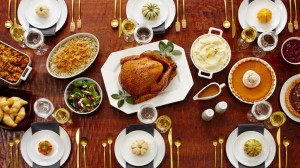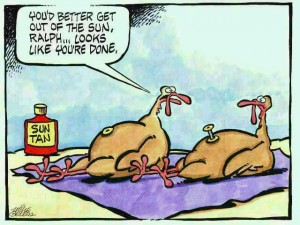By Chelsea Chang | Blogger | SQ Online (2014-15)
Raise your hand if you’re excited for Thanksgiving – this wonderful, beautiful holiday where college students like us can finally go home and rest our fatigued minds with family, fun, traditions and food – oh, the food.
What are some of your favorite Thanksgiving dishes? Is it your mom’s signature garlic mashed potatoes or your proud dad’s stuffed turkey? What are the things that you look forward to the most during Thanksgiving? Before we talk about more food that will make us drool in front of the  screen, let’s talk about the most prevalent encounters during Thanksgiving – food comas – and how to “avoid” them better this year so you can enjoy more time playing, hiking and hanging out with friends and family.
screen, let’s talk about the most prevalent encounters during Thanksgiving – food comas – and how to “avoid” them better this year so you can enjoy more time playing, hiking and hanging out with friends and family.
Food coma is scientifically known as postprandial somnolence, a normal state of drowsiness following a meal¹, so yes, it is an actual biological phenomenon. It is a response of the nervous system when the “rest-and-digest” activities are triggered in our bodies during a food coma. That is why we often feel drowsy and tired after a big meal. However, food coma is not just the result of a large amount of turkey consumption; eating starchy and processed carbohydrates also adds a lot to this sleepy post-meal experience because when the body breaks down carbohydrates into simpler sugars, insulin, which regulates the metabolism of carbohydrates and fats², removes the sugars so effectively that our blood sugar drops below the resting level³.
Here are 3 ways you can help your metabolism stay constant and decrease the chance of feeling sorry later.
- Don’t Fast and Don’t Binge
Many people skip meals the whole day so that they will have “stomach space” for THE Thanksgiving meal. This strategy often leads to overeating and a super drowsy night. Research shows that even in healthy people, the endothelial cells lining blood vessels are temporarily weakened after a very large meal³, and that increases risks of strokes and other sudden heart diseases. So don’t fast completely during Thanksgiving; instead, eat small healthy snacks throughout the day so both your mind and body are prepared for the big awesome dinner!
- Simple Exercises
Go on a walk around the neighborhood in the morning or after your meal! Walking not only is a great bonding activity you can enjoy with family, but light exercises can also help you digest and burn off some calories that you either already consumed or will definitely consume later.
- More Turkey, Less Potatoes
Carbohydrates have a high glycemic index, a number associated with blood sugar levels that can be affected by a particular food. In contrast, lean proteins, like turkey, have significantly lower glycemic indexes and will not induce crazy blood sugar strikes in your body. Therefore, try to eat a moderate amount of carbohydrates like mashed potatoes, pumpkin pies and stuffing, and you will have fewer regrets in the end.
 There you have it, folks! I hope this post can help you pace yourself with some of the best meals of the year. I wish you an amazing Thanksgiving with family and friends!
There you have it, folks! I hope this post can help you pace yourself with some of the best meals of the year. I wish you an amazing Thanksgiving with family and friends!
[hr gap=”0″]
Sources:
- http://www.medscape.org/viewarticle/483029
- http://www.medicinenet.com/insulin/article.htm
- http://www.phase-iv.net/node/398
- http://www.health.harvard.edu/newsweek/Glycemic_index_and_glycemic_load_for_100_foods.htm
Image Sources:
- http://www.bettycrocker.com/~/media/Images/Betty-Crocker/Menus-Holidays-Parties/MHPLibrary/Holidays/First-Thanksgiving/First-Thanksgiving-Menu_hero.jpg
- http://media-cache-ak0.pinimg.com/736x/fa/fe/34/fafe34ae6e3edc0d4c04e1ad8f4cae3f.jpg
- http://www.ashrayamission.com/wp-content/uploads/2011/11/thanksgiving2.jpg
- https://www.christmas-treasures.com/OldWorldChristmas/Catalog/GrettingCards/Images/89817.jpg



